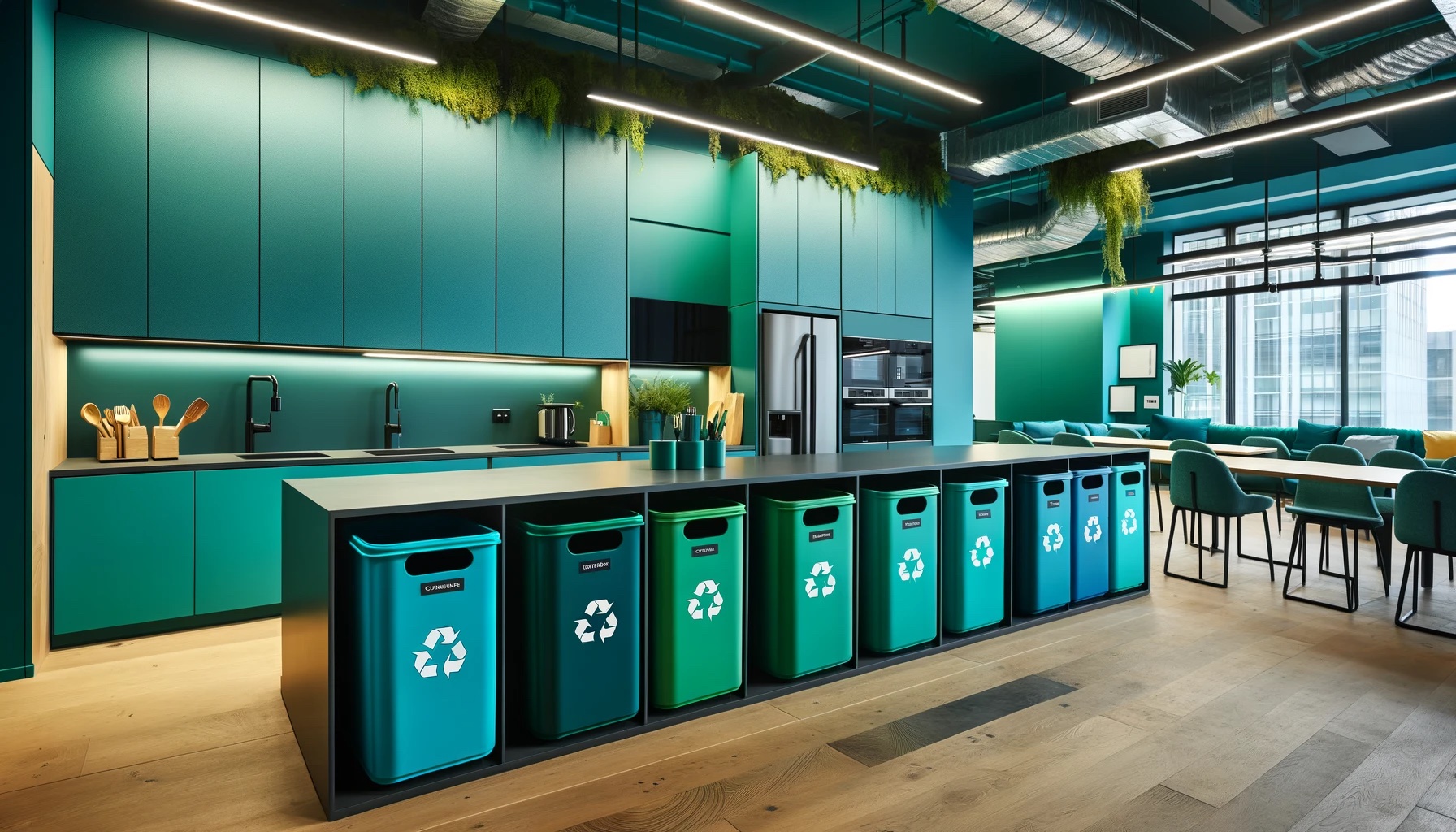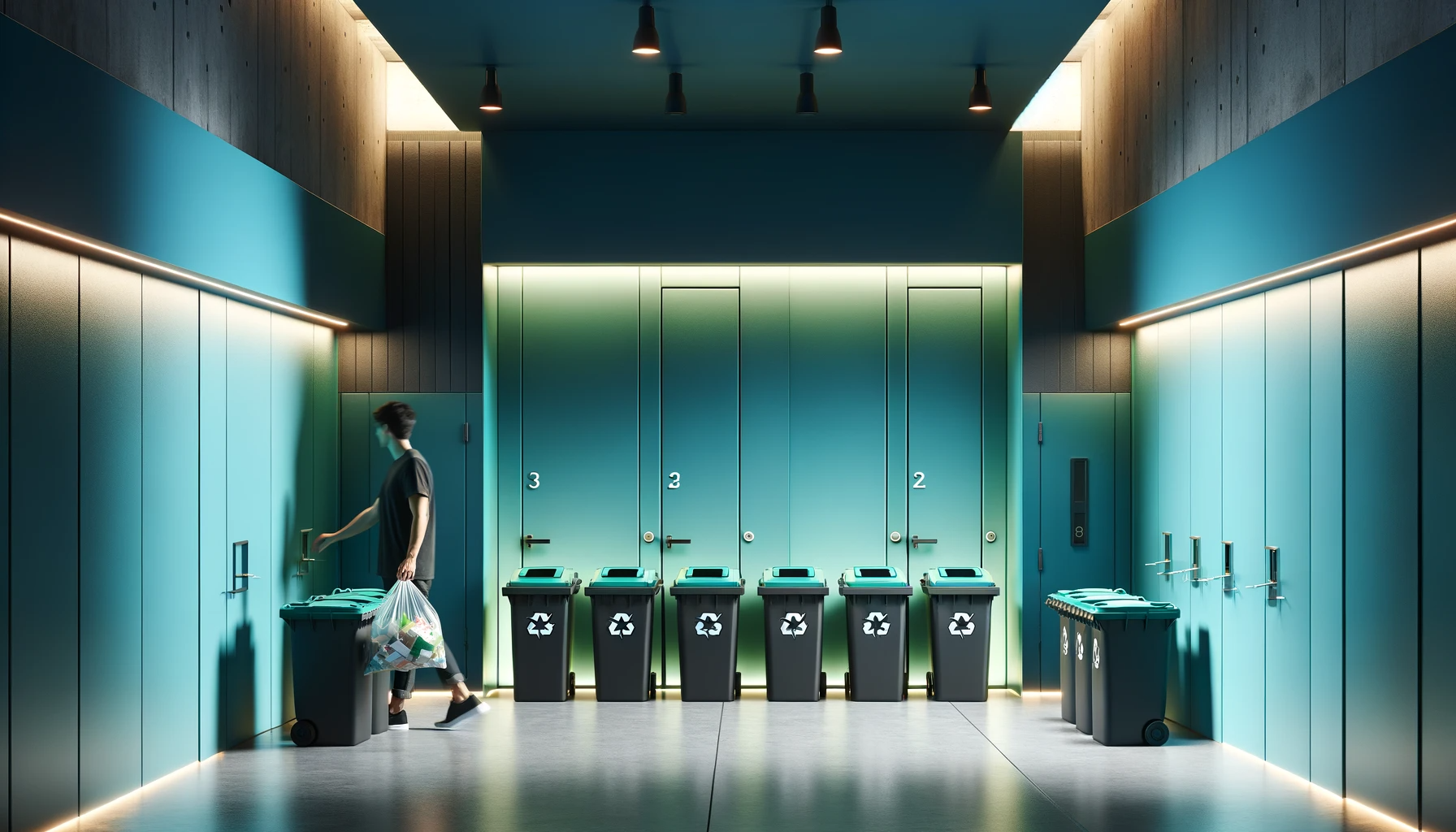Enhancing Environmental Stewardship: Waste and Recycling Strategies for LEED Certification
In the city of Vancouver, BC, we find ourselves at the confluence of urban progress and environmental responsibility. As the world becomes increasingly conscious of the environmental impact of human activities, the imperative for sustainable building practices has never been more pronounced.
The Leadership in Energy and Environmental Design (LEED) certification emerges as a crucial yardstick in this context, providing a comprehensive framework for environmentally sustainable construction, operation, and maintenance of buildings. It is a certification that not only reflects a building’s environmental performance but also its proprietor’s commitment to a greener tomorrow.
As our city strives to meet its ambitious sustainability targets, understanding and implementing effective waste management and recycling strategies become pivotal in securing and enhancing LEED certification.
Understanding LEED Certification:
LEED, developed by the U.S. Green Building Council (USGBC), stands as an internationally recognized mark of excellence in green building. It provides building owners and operators with a concise framework for identifying and implementing practical and measurable green building design, construction, operations, and maintenance solutions.
LEED certification is allocated based on a points system, with different levels of certification awarded according to the total points accrued. The integration of waste management and recycling strategies is an area where significant LEED points can be garnered, emphasizing not just the reduction of waste, but also the thoughtful diversion of it from our strained landfills.
The Intersection of Waste Management and LEED:
Effective waste management and recycling programs are not ancillary to LEED; they are at its core. LEED's assessment criteria encompass various aspects of waste management, from the sourcing of materials to the disposal or recycling of construction and operational waste. By prioritizing these areas, businesses can not only improve their LEED score but also contribute to a more sustainable construction ecosystem.
Waste diversion, for example, is a critical component where points can be earned by demonstrating a reduced impact on ecosystems and waterways, enhancing the health and well-being of both construction workers and building occupants, and promoting the reuse and recycling of materials.

Key Waste and Recycling Programs for LEED Points:
- Materials & Resources Credit: Building Product Disclosure and Optimization - Material Ingredients: By choosing products with verified life-cycle information and recycled content, buildings can minimize their impact on the environment and gain LEED points. Programs that encourage the selection of such products and provide transparency about their ingredients are essential in this effort.
- Materials & Resources Credit: Construction and Demolition Waste Management: Vancouver's construction sector can contribute to LEED points by implementing strategies aimed at waste diversion. This can be achieved by meticulous planning to reduce on-site waste, reusing materials, and ensuring the remaining waste is recycled.
Advancements That Can Enhance Your LEED Score:
Adopting advanced waste management practices can significantly impact your LEED score. Consider the following strategies:
- Innovation in Procurement: Establishing procurement policies that prioritize environmentally preferable products is vital. This includes purchasing materials with high recycled content, bio-based materials, wood products certified by the Forest Stewardship Council, and locally sourced goods to reduce transportation impacts. Innovative procurement strategies not only contribute to a better LEED score but also support the local economy and reduce the carbon footprint associated with material transportation. Growing City can work with your team to vet and secure the proper procurement partners for your buildings.
- Enhanced Waste Stream Audit: Conducting comprehensive waste stream audits goes beyond basic recycling programs. These audits can pinpoint specific waste streams that can be reduced or diverted from landfills. By regularly assessing the waste stream, you can adjust your waste management practices in real-time, leading to continual improvements in both waste reduction and LEED points. Growing City can set baseline audits, or ongoing audits to ensure your meeting your targets.
- Comprehensive Composting: Expanding your composting program to encompass all compostable waste, including food scraps and compostable plastics, can earn additional LEED points. Composting not only reduces the volume of waste sent to landfills but also creates a valuable product that can be used to enhance soil and support local agriculture. Growing City has been specializing in organics recycling and composting services since 2009 and can create customized programs to suit all your building's needs.
Interesting Facts and Figures:
To underscore the impact of these initiatives, consider these compelling facts and figures:
- According to the USGBC, LEED-certified buildings have the potential to reduce waste output by as much as 70%. This dramatic reduction is achieved through strategies that prioritize waste diversion and recycling during both construction and occupancy phases.
- In Vancouver, the push towards sustainability has yielded impressive results. The City's Greenest City 2020 Action Plan targeted a 50% reduction in waste going to the landfill or incinerator by 2020 from 2008 levels. By embracing innovative recycling and waste management programs, Vancouver has made significant strides toward this goal.
- Recycling does more than just conserve landfill space. For instance, recycling one ton of office paper can save the energy equivalent of consuming 322 gallons of gasoline.

Operational Waste Management for LEED Points:
Focusing on operational waste management, there are several ways in which buildings can improve their LEED score:
- Implementing Zero Waste Policies: Buildings that aim for zero waste certifications or that can demonstrate a high diversion rate can achieve additional points under LEED. This requires a concerted effort across all levels of operation, from management to tenants.
- Tenant Education and Engagement: A successful recycling program depends heavily on participation. By educating tenants and engaging them in your building's sustainability efforts, you can improve waste stream diversion rates. This can involve providing clear signage, regular communications about waste management best practices, and feedback on progress towards goals.
- Monitoring and Reporting: Consistent monitoring and reporting of waste and recycling efforts not only provide transparency but also create accountability. LEED rewards efforts to quantify waste production and diversion, encouraging buildings to track their progress and make data-driven decisions to improve their sustainability performance.
By continuing to implement and refine these strategies, buildings in Vancouver can not only improve their environmental footprint but also their standing in the LEED certification program.
Strategic Implementation for Maximum LEED Points:
The journey towards LEED certification is ongoing and requires a strategic approach:
- Holistic Waste Management Planning: Develop a waste management plan that encompasses all phases of a building's life cycle, from design to demolition. This plan should include goals for waste prevention, recycling, and reuse, as well as clear guidelines for occupants on how to contribute to these goals.
At Growing City, we understand that an effective waste management plan is the cornerstone of sustainability. Our consultants work with you to create a comprehensive strategy that addresses all stages of your building's lifecycle, ensuring that your waste prevention, recycling, and reuse goals are not only met but exceeded. With our guidance, your plan will align with LEED requirements, setting the stage for higher certification levels.
- Innovative Recycling Technologies: Invest in cutting-edge recycling technologies that can increase the efficiency and scope of recycling programs. This could include everything from advanced sorting technologies that can handle a wider range of recyclables to on-site systems that process waste materials for reuse in the building.
Stay ahead of the curve with Growing City's advanced recycling solutions. We offer state-of-the-art technologies that expand the range of recyclable materials and improve sorting efficiency. By partnering with us, you'll leverage innovative systems that can process waste on-site, turning it into a resource, thus enhancing your LEED points and environmental impact. - Collaboration with Waste Management Providers: Work closely with waste management providers to tailor services to the building's specific needs. This can help to ensure that the maximum amount of waste is diverted from landfills and that the materials collected are processed in the most environmentally responsible manner.
Growing City prides itself on strong relationships with leading waste management providers. Our collaborative approach ensures that your services are customized to your building's specific needs, maximizing waste diversion and optimizing processing methods. We'll help you navigate the complexities of waste management, ensuring that you earn every possible LEED point through meticulous and responsible waste handling. - Green Procurement and Vendor Policies: Establishing procurement policies that favor vendors and contractors who practice waste reduction can extend your sustainability efforts beyond the immediate boundaries of your property.
Growing City can assist you in developing and implementing green procurement policies. By choosing vendors and contractors who share your commitment to waste reduction, you're extending your sustainability efforts and enhancing your LEED certification prospects. Let us help you build a network of green partners, ensuring that your environmental objectives are met with every purchase and contract.

Community Impact and Engagement:
The benefits of a robust waste and recycling program extend well beyond the confines of individual buildings:
- Contribution to Municipal Sustainability Goals: By contributing to the city's sustainability goals, buildings that achieve LEED certification help Vancouver move closer to its vision of becoming a greener, more sustainable city for all residents.
- Economic Benefits: Effective waste management and recycling programs can lead to cost savings by reducing disposal fees and generating revenue from recyclable materials.
- Public Health and Quality of Life: These programs contribute to cleaner air and water, less landfill waste, and reduced greenhouse gas emissions, all of which have a direct positive impact on public health and the overall quality of life in the community.
The path to LEED certification is as challenging as it is rewarding, serving not only as a testament to environmental responsibility but also as a beacon of innovation and sustainability leadership. It is a comprehensive effort that requires the commitment of every stakeholder involved in the life cycle of a building.
As we look towards the future, the imperative for sustainable waste management and recycling programs is clear. They are not just a means to an end for achieving LEED certification; they are a fundamental component of our collective responsibility to the environment and to future generations.
We invite all property owners, managers, and occupants in Vancouver to take these steps towards sustainability. Evaluate your current waste management and recycling programs, set ambitious but achievable goals, and work tirelessly towards them. Together, we can contribute to a greener Vancouver and set a standard for environmental stewardship that will resonate across cities worldwide.
References:
U.S. Green Building Council. (2018). "LEED v4 for Building Operations and Maintenance – Current Version."
City of Vancouver. (Year). "Greenest City 2020 Action Plan."
Forest Stewardship Council. (2020). "Why Choose FSC Certified Wood?"
Recycling Council of British Columbia. (2020). "Recycling Facts."
Zero Waste International Alliance. (2018). "Zero Waste Definition."
%20(1).png)
.jpg)




